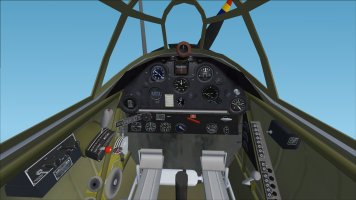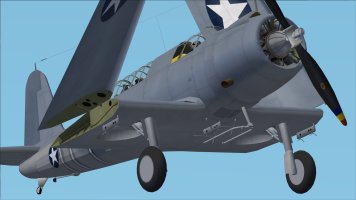Vought SB2U-3 Vindicator
Unit: Marine Scout Bombing Squadron 241 (VMSB-241) Midway Island, June 1942
Pilot: 2Lt James H. Marmande and rear seat gunner PFC Ed Colvin, lost after attacking the Japanese battleship Haruna on June 4, 1942
The SB2U-3 was developed to fill a Marine Corps requirement for a dive bomber with extended range and 57 were ordered in September 1939. The horizontal stabilizer span was increased from 13ft 3in, to 15ft 2in, a larger cowling air scoop was added, unprotected internal fuel tanks were installed increasing fuel from 118 gallons to 420 gallons, and provision was made for 4 wing 50 caliber machine guns and one for the rear gunner. Usually only one was fitted. This increased the operating weight by more than 1,000 pounds with no power increase. That made performance decidedly sluggish rendering it unfit for carrier operations, although it still retained its tail hook.
This was the only US version of the Vindicator to see combat - at Midway June 1942 with VMSB 241. See the included Vindicator history document for the details.
Of note: VMSB-241's Vindicators were due for overhaul and the fabric was wearing thin. Without any fabric available for repairs, the crews resorted to using 4 inch medical tape, clear doped over thin areas to hold it in place. That is the white stripes on this aircraft, not some kind of unit markings.
Credits
Captain Kurt: Aircraft model, US Naval ordinance bombs, bomb racks, VC, paint textures, panel, flight, and .dp file.
Shessi: Pilot figures
Kelticheart: Prop blurred texture
BeePee: compass gauge
unknown: some gauges
Microsoft: Gauges and .air file



Unit: Marine Scout Bombing Squadron 241 (VMSB-241) Midway Island, June 1942
Pilot: 2Lt James H. Marmande and rear seat gunner PFC Ed Colvin, lost after attacking the Japanese battleship Haruna on June 4, 1942
The SB2U-3 was developed to fill a Marine Corps requirement for a dive bomber with extended range and 57 were ordered in September 1939. The horizontal stabilizer span was increased from 13ft 3in, to 15ft 2in, a larger cowling air scoop was added, unprotected internal fuel tanks were installed increasing fuel from 118 gallons to 420 gallons, and provision was made for 4 wing 50 caliber machine guns and one for the rear gunner. Usually only one was fitted. This increased the operating weight by more than 1,000 pounds with no power increase. That made performance decidedly sluggish rendering it unfit for carrier operations, although it still retained its tail hook.
This was the only US version of the Vindicator to see combat - at Midway June 1942 with VMSB 241. See the included Vindicator history document for the details.
Of note: VMSB-241's Vindicators were due for overhaul and the fabric was wearing thin. Without any fabric available for repairs, the crews resorted to using 4 inch medical tape, clear doped over thin areas to hold it in place. That is the white stripes on this aircraft, not some kind of unit markings.
Credits
Captain Kurt: Aircraft model, US Naval ordinance bombs, bomb racks, VC, paint textures, panel, flight, and .dp file.
Shessi: Pilot figures
Kelticheart: Prop blurred texture
BeePee: compass gauge
unknown: some gauges
Microsoft: Gauges and .air file


